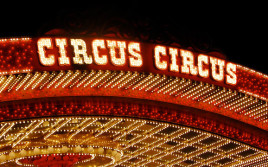Transcript
Year-in, year-out the circus comes to town. But in 2013 circuses are in trouble. Seen by many as entertainment from a bygone age and facing Government action to ban circuses with wild animals, what is it that keeps circuses on the road? Why do they carry on going?
 In this podcast, Lee Millam talks to Professor Ron Beadle, Director of Research Ethics at Northumbria University, who has published the first major study of the motivations of circus-owner directors in the UK and Ireland. His research, published in The Journal of Business Ethics, examines the factors that drive circus managers to continue in the industry despite such intense opposition and obstacles. “The people who run Britain’s circuses do it for love, not for money…Their business is vulnerable to the weather, to animal rights protestors, hostile local authorities and increasing fuel costs. Yet they continue because of an emotional bond with their art form and the people who perform it. The circus is a unique form of entertainment. Unlike the theatre, the artists create their own performance and on every circus you can find people from across the world living and working together in a single travelling community. Like many modern organisations, circuses are both global and local and have been like that for a very long time.”
In this podcast, Lee Millam talks to Professor Ron Beadle, Director of Research Ethics at Northumbria University, who has published the first major study of the motivations of circus-owner directors in the UK and Ireland. His research, published in The Journal of Business Ethics, examines the factors that drive circus managers to continue in the industry despite such intense opposition and obstacles. “The people who run Britain’s circuses do it for love, not for money…Their business is vulnerable to the weather, to animal rights protestors, hostile local authorities and increasing fuel costs. Yet they continue because of an emotional bond with their art form and the people who perform it. The circus is a unique form of entertainment. Unlike the theatre, the artists create their own performance and on every circus you can find people from across the world living and working together in a single travelling community. Like many modern organisations, circuses are both global and local and have been like that for a very long time.”
The modern circus began in Britain in the 1760s before being exported to the rest of the world. They became enormously popular in the 19th Century and the first half of the twentieth century but the last few decades have seen a marked decline.
Professor Beadle’s research, entitled Managerial work in a practice-embodying institution: The role of calling, the virtue of constancy, is published in The Journal of Business Ethics.


This article was very interesting because it is something that not only look at other countries, in Mexico too, so many cases of circuses, two months ago, I went to a circus, I could tell that it isn’t the same circus animal to a circus without animals is just as fun, but actually doing not many people that think the illusion of all children were able to see the animals, since it is the only look that could have them so close, however I agree not to allow them to regain the animals that the poor suffer much with this situation and we can not be so selfish to say we do not care about your life and follow that craving.